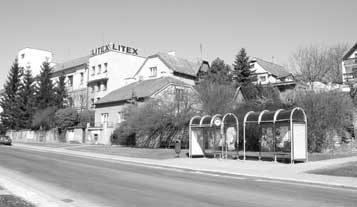
| ▪ back | ||
The Story of a Light-Fingered Dentist |
||
|
Doctor Traubová was a dentist. She lived in what is today 459 Na Lánech street or next to it and her surgery was there. The building, which has been rebuilt several times, now houses the Litex Company´s O2 plant. She was single, of medium-height, with black hair. She lived with her mum; she had neither husband nor children. She was known in the town as an excellent dentist, kind and skilful. She charged 5 CZK for one filling. She could also make uneven teeth straight using golden wires; the aid looked like a modern brace. She knew that the method worked for children who were fourteen years or older. Such a cure was very expensive. Mrs. Kobylková, née Doubravová, remembers that it would have cost her 5 000 CZK to have her teeth straightened. Her parents could not afford to pay that much money so they agreed on a short-term treatment with the dentist, which was not very effective. Mrs. Pavlišová, née Zelinková, relates the story, "I had an overbite. The dentist took an imprint and applied a rubber brace on my bottom teeth. She fixed it to my teeth with cement. I had to go to the surgery every day so the dentist could rub it off bit by bit. After three months she took the brace off, covered my teeth with some lotion and after a few days, she gave me a silver brace. My classmates thought I had the silver foil used for wrapping chocolate on my teeth. My parents paid about 4 000 CZK for the treatment. Before that, the dentist straightened my brother´s teeth and she did it very well. She didn´t get to finish my treatment though because she committed suicide." Doctor Traubová employed a dental practitioner and a young woman who "blended fillings" for her. Marie Tomanová, who came from Litomyšl, trained to be a dental technician with Dr. Traubová´s support. We know from her nurse that Dr. Traubová was very strict with her employees, but she taught Marie a lot, so she could get an excellent job in Prague. The dental surgery was modern and elegant. We know that when Mrs. Doubravová first went there with her daughter, she was captivated by it and praised the surgery, saying, "It´s very nice here. It must have cost a lot of money." Dr. Traubová explained to her that her fellow church-goers had clubbed together to support her. They had helped her finacially so she could study in Prague and then also to set up her business. The agreement was that once she started making money she would pay the loan back in installments. So, she had a nice surgery, but lived modestly. According to her contemporaries, Dr. Traubová died in about 1937; she is said to have committed suicide. Some think that she did it because of the news of the persecution of Jews in Germany. Petr Kašpar |
||
|
